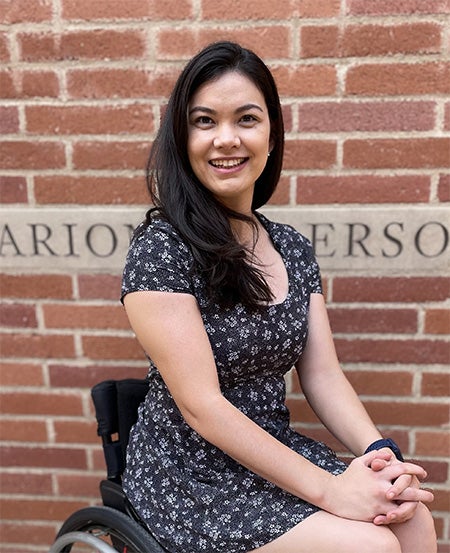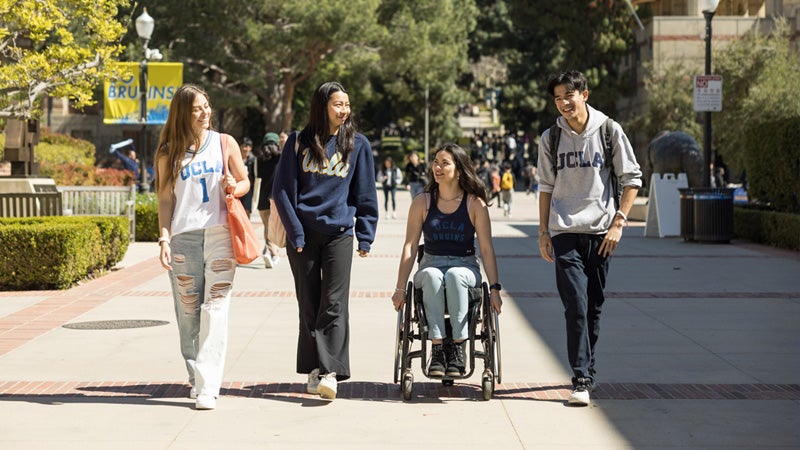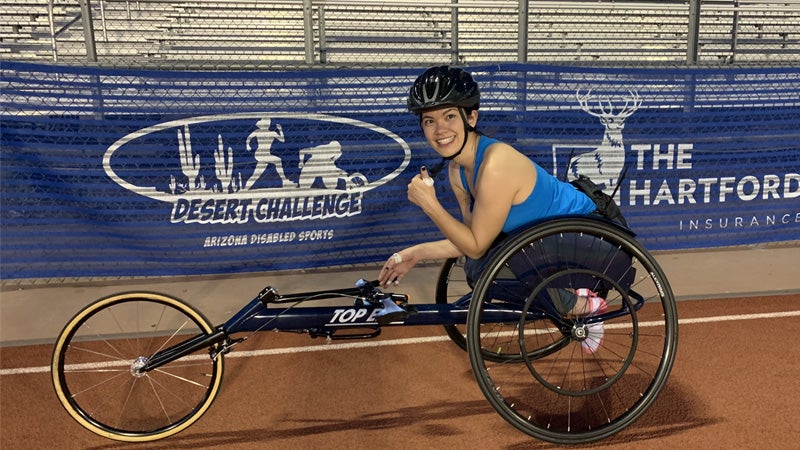An Accessibility Expert Cultivates Allies for a More Inclusive Campus
An Accessibility Expert Cultivates Allies for a More Inclusive Campus
UCLA Anderson FEMBA Carolanne Link (’23) is recognized for her EDI leadership
MARCH 23, 2023


UCLA Anderson Fully Employed MBA student Carolanne Link (B.S. ’18, ’23) is project manager of the UCLA Web Accessibility Initiative at UCLA’s Disabilities and Computing Program. She is Anderson’s first FEMBA Council VP for equity, diversity and inclusion, a position she has held for the last two years. She was recently awarded UCLA’s inaugural Equity, Diversity and Inclusion Student Leadership Award, which recognizes students who have made significant positive contributions to the advancement of EDI. She was selected based on her leadership, innovation and engagement in efforts to revolutionize the accessibility of UCLA’s digital properties as well as its physical campus.
Link was born with cerebral palsy and uses a wheelchair for mobility. She remembers the difficulty of navigating the UCLA campus as an undergraduate, before she found funding for her first wheelchair. She often had to stop and rest, or find a way around physical barriers, occasionally being carried by classmates. And then she had to explain to her professors why she might often run late for class. She is an expert in evaluating and accommodating this kind of situational disability that able-bodied people usually don’t consider. Link returned to her alma mater as a staff member with the aim of improving accessibility for disabled students in higher education and to help UCLA prepare to host the 2028 Paralympic Games. She happens to be an athlete in training herself.
Q: Congratulations on earning the EDI Student Leadership Award. What specific campus changes have occurred as a result of your work, and what did it take to make them?
The work that we’ve done, both with the campus Disabilities Computing Program and with UCLA Anderson’s EDI Advisory Council and FEMBA EDI Committee, has been very meaningful to me. For example, at the DCP we conduct workshops and trainings, both technical and cultural, for the entire campus community on allyship. We provide consulting services and conduct accessibility reviews.
What I love to do is expand people’s default ideas of what EDI looks like or should be like in institutions. People focus on gender, especially women as minorities, and on persons of color, and we fail to have the same breadth of conversation around other identities. Disability is one of those, but so are things like veteran status, immigrant status. We just don’t seem to talk as a society about those as much. So I hope to normalize conversations about those other demographics.
Q: What has earning your MBA at Anderson added to the experience?
As a person working in the public sector — specifically at UCLA — I was looking for business school curriculum and techniques to better impact those spaces, and I was a minority among classmates. At first, I was intimidated by all these go-getters excited about traditional pathways. It was definitely a journey of self-discovery and finding the confidence within myself to say mine is a valid path as well.
That realization came when I took the Ethics, Values and Tradeoffs class with Professor Eugene Caruso. He covers all these ethical issues that can arise in business, and the decisions that business leaders have to make. His lectures on the tradeoffs we have to think about really helped me, for the first time, frame them in the ways that I wanted to see them — that, as leaders, we have this duty to try to do good, and here are some tools to help us do that. I was so excited to feel that immediacy of impact from the curriculum.

Link (seated) conducted her Anderson capstone project consulting for a New Zealand sustainable air filter company, along with teammates Barry Lawrence, Emily Tsai, Andy Peng and Allen Chen, all FEMBA Class of 2023
Q: How do people receive or react to “EDI” as a branded concept when you introduce it into trainings and consultations, or simply in the wider world?
It can be divisive. My big dream for the concept as a whole, and in institutional implementation, is that people aren’t afraid of it, people aren’t immediately resistant, and people understand EDI as a vessel for compassion and learning about each other.
When I was an undergraduate, UCLA actually added in a diversity requirement to graduate. It was not a specific class, it was a choice from this breadth of electives that fulfilled that requirement. I really liked the fact that it made people think about the idea of diversity without forcing everyone to take one specific subject or think about it in a specific way, because that pushes people away from the concept.
When I teach advocacy for EDI, I try to frame it as introspection and humility. Others need to recognize that you get to be an expert on your story and share it. And that’s so powerful. But you also get to be a novice in everyone else’s story and learn about it, and then take those concepts to help create a better and more inclusive place for others as well. It’s okay to not know what the right thing to say is. Even just simple guidance can be really meaningful to people who are desperately trying to do this right. I wish there were a booklet of five steps to doing this exactly perfectly.
When we teach our allyship trainings, I try to emphasize that, even if you’re not successful 90% of the time, just keep up that message because you’re going to reach someone. The first step as an ally is not giving up.
Q: Can you explain what is meant by “situational” disability?
Some disabilities, mine included, manifest nervousness as pain and spasms. This means that, beyond the standard mobility obstacles, in a high-stress situation, I’ve got more to battle with. There may be no obvious barrier, and the space may be physically accessible, but unseen complications — just being anxious about a presentation for example — can cause medical flare-ups. These can go as far as inhibiting your immune system and making you sicker or, if you’re like me, creating soreness and difficult movement for days after the catalyst.
Once, an Anderson classmate asked me how allies should respond to able-bodied persons using accessible restroom stalls. First, I was thrilled that she bothered to ask. I told her that the best thing to do is to lead by example. You don’t know if someone has an invisible disability, so scolding doesn’t help. But if it’s a friend, you could mention the issue privately. I told her about a time at Disneyland when I was really desperate for the restroom and it was completely packed. I was about six people back and the woman in the front of the line saw that one of the accessible stalls opened up. Instead of just proceeding to it, she turned around to me and ushered me toward it. I was eternally grateful and thankful for her as an ally. I reflect on this moment a lot, because that was a huge ally move, to be aware that there were limited resources for me. My big hope is that the other ladies who witnessed this kindness were influenced and now look out for that moment in their own lives.
The remote learning option that came out of pandemic has increased access. But it’s also been a frustration for people who never quite got the hang of this modality, which means not every class you might want to take is offered in hybrid format. I brought the issue to Anderson’s deans to understand it better because some professors loved being able to give people that option, and others found it inconvenient and distracting.
So Dean Gonzalo Freixes decided to teach his course “dual modal.” He said he wanted to understand first hand what our professors were going through, the good and the bad. He could have just said, “Sorry, I’m an administrator, it’s up to your professor.” But from what I understand, he had an overall positive experience teaching that way. And the fact that he went out of his way to do that made me feel so supported. He tried something to move that accessibility needle a little bit and to empathize with both sides. This was a master class-level ally move by Dean Freixes and I’m so thankful he led by example.

Link navigates the UCLA campus with students she supervises in the Disabilities and Computing Program
Q: What about your Anderson experience has prepared you for the job you currently do?
One of the best things is actually how FEMBA’s assistant dean, Dylan Stafford, advertised it when I was looking at prospective business schools: You learn something on Saturday and then apply it on Monday. When I started at Anderson, I tested everything, like how I conduct myself in meetings. I’m a very non-confrontational person. Being in meetings with higher-ups had been really intimidating. I’ve learned how to speak enough but not too much. And I’m still learning that balance.
I took communications classes in the Marketing area that have helped me both in interpersonal comms and in presenting. I’ve learned how to frame my issues. As someone who grew up identifying as a minority throughout my life, I know you can pitch EDI to someone who shows immediate resistance or may not understand it at all or may have some troubling misconceptions about certain demographics. Learning how to approach those conversations as a leader and as a businessperson, but also as a human being, has been a real journey. It can be stressful to try to explain over and over what disabled students need for access to an education and why, but repeating the message is huge.
Q: What’s your next UCLA project to tackle?
I’m seeking funding to help inventory and map all of the accessible restrooms on campus. The university’s facilities department keeps track of every campus bathroom for maintenance purposes, but their database does not indicate whether each restroom is accessible. The geography department has generously donated some time to help us with it and I’m donating my time to it, along with one of my students. There are more than 2,000 bathrooms that we have to verify in person. If you’re a prospective student and you’re coming to visit campus, you want to know what’s going to be accessible to you. Just having that resource available can make you feel like this is where you belong.

Link’s first wheelchair race was at the Desert Challenge Games in Arizona
Q: Finally, what event are you actively training for to compete in the Paralympic Games?
Women’s T34 100 meters. I’m not sure if it’ll happen for Paris in 2024. If not, maybe L.A., but I’m training six days a week. Regardless of whether I make it to that elite level, it’s a wonderful way to keep active and aspire to be a better me.
As a child, I lived vicariously through my brother, who is an amazing athlete. Both my parents are amazing athletes, too, and I just kind of tagged along and did my best to participate. But I never felt like an athlete myself. So this is the first time I’ve ever even dipped my toe in those waters. And I want to dream big.